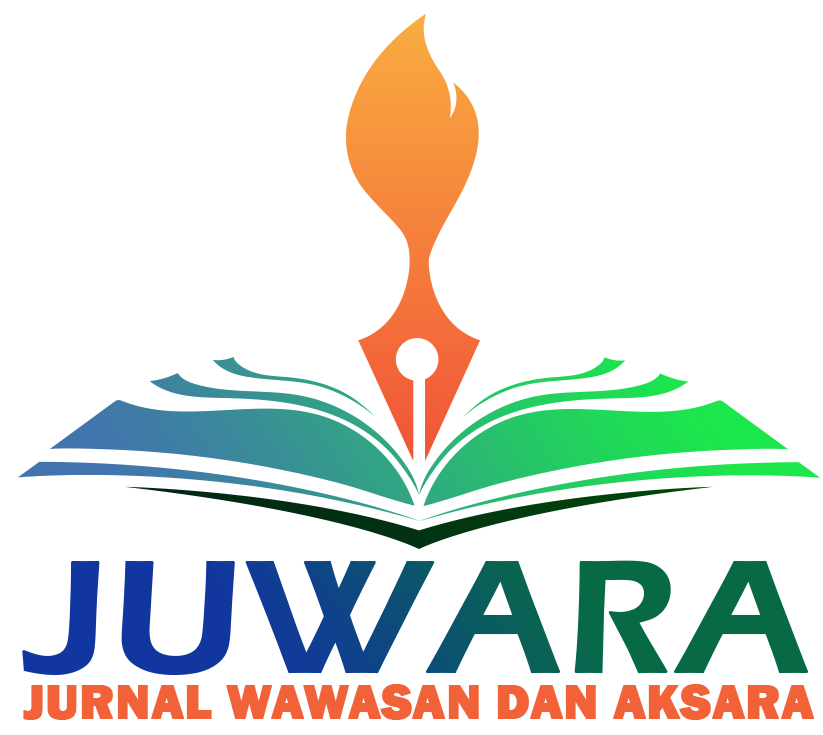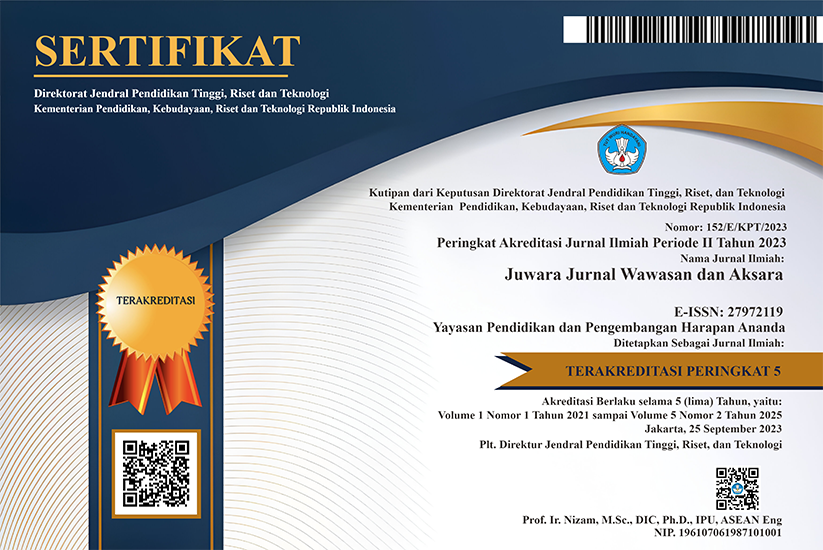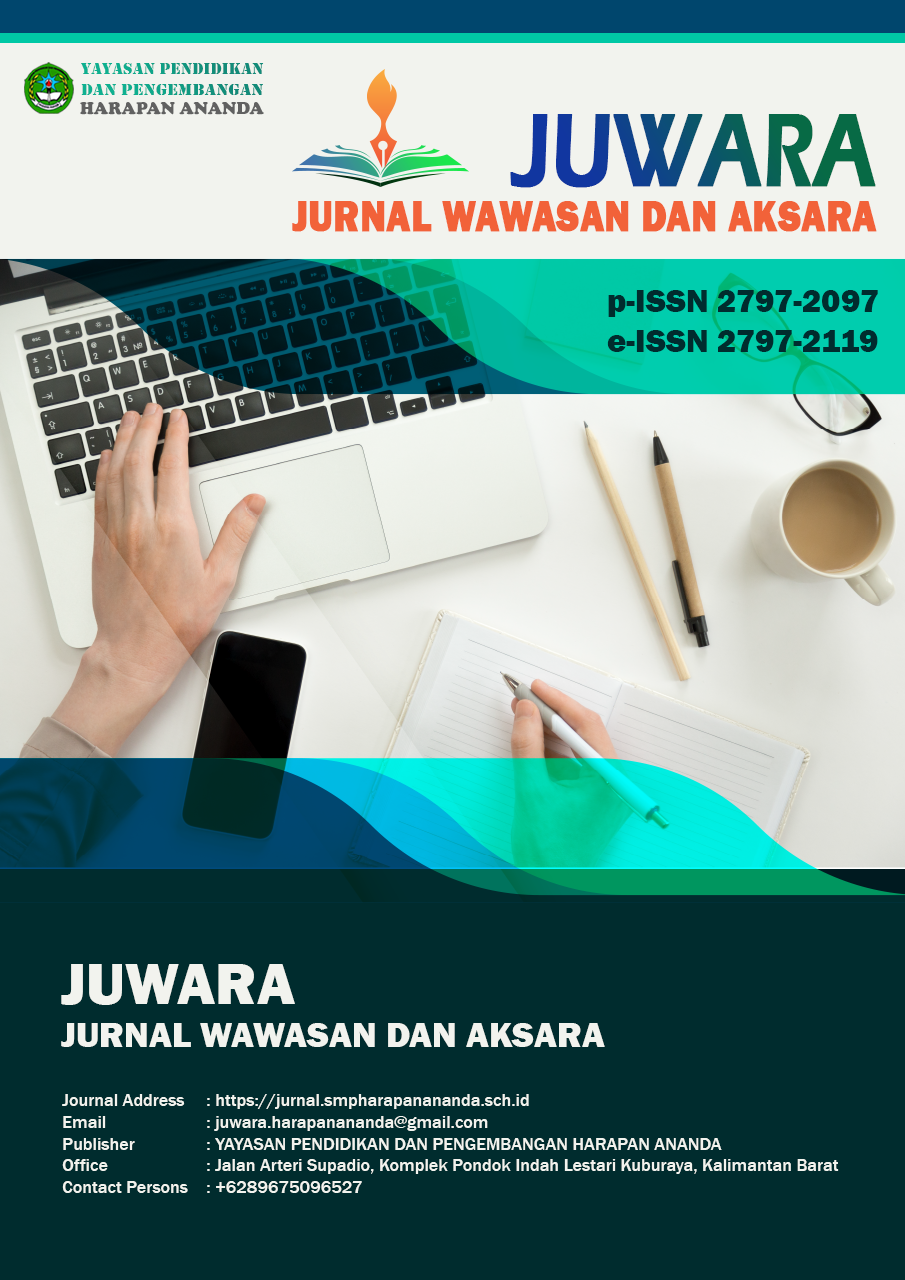21st Century Sociology Learning: Integrating Digital Literacy, Collaboration, and Critical Thinking
DOI:
https://doi.org/10.58740/juwara.v5i1.430Keywords:
21st century learning, collaboration, critical thinking, digital literacyAbstract
The rapid transformation of global society in the digital age necessitates the integration of 21st century competencies in higher education, particularly in the field of sociology. This study investigates the effectiveness of integrating digital literacy, collaborative learning, and critical thinking into sociology education among undergraduate students. A descriptive quantitative method was employed, involving 35 students from the Sociology Education Study Program at a public university in Indonesia. Data were collected through a validated Likert-scale questionnaire comprising 30 items across three core constructs. Descriptive statistical analysis revealed that students perceived the integration of these competencies to be highly effective. Digital literacy scored a mean of 4.31 (SD = 0.46), collaborative learning 4.25 (SD = 0.52), and critical thinking 4.37 (SD = 0.48), all categorized as “very high.” The overall average score was 4.31, corresponding to 86.2% in percentage agreement. These findings suggest that the learning model successfully fosters essential 21st century skills, equipping students with digital fluency, social collaboration, and analytical capacity in the context of sociological inquiry. The study concludes that a purposeful pedagogical design embedding these three competencies enhances students’ academic engagement and critical sociological understanding. It also calls for broader implementation and further research to explore long-term impacts and institutional scalability of 21st century learning frameworks in higher education.
References
Aslan, S., Alanoglu, M., & Karabatak, S. (2025). Enhancing 21st-century teaching competencies: The key role of digital literacy in connecting pre-service teachers’ TPACK. Information Development, https://doi.org/10.1177/02666669251315841
Bashi, V. (2023). Be More Critical About Critical Sociological Thinking. Sociological Forum. https://doi.org/10.1111/socf.12963
Brundage, M., Malespina, A., & Singh, C. (2023). Peer interaction facilitates co-construction of knowledge in quantum mechanics. Physical Review Physics Education Research. https://doi.org/10.1103/physrevphyseducres.19.020133
Damanik, F. H. S., & Muhammad, G. (2025). Sociology of Education Analysis on the Deep Learning Approach to Teaching. Journal of Sumatera Sociological Indicators, 4(1), 348-357. https://doi.org/10.32734/jssi.v4i1.20020
García-Moro, F., Gómez-Baya, D., Muñoz-Silva, A., & Martín-Romero, N. (2021). A Qualitative and Quantitative Study on Critical Thinking in Social Education Degree Students. Sustainability. https://doi.org/10.3390/SU13126865
Ilkay, G., Kivanç Öztug, E., Eren, H. C., & Sülün, E. (2025). Transformative 21st Century Approaches in Musical Ear Training: Fostering Essential Skills for Enhanced Learning. SAGE Open, 15(2), https://doi.org/10.1177/21582440251326438
Leaning, M. (2019). An approach to digital literacy through the integration of media and information literacy. Media and communication, 7(2), 4-13. https://doi.org/10.17645/mac.v7i2.1931
Martínez-Bravo, M. C., Sádaba Chalezquer, C., & Serrano-Puche, J. (2022). Dimensions of digital literacy in the 21st century competency frameworks. Sustainability, 14(3), 1867. https://doi.org/10.3390/su14031867
Machin-Mastromatteo, J. (2021). Information and digital literacy initiatives. Information Development, 37, 329 - 333. https://doi.org/10.1177/02666669211031695
Nurfazri, M., Irwansyah, F. S., Lukman, F., Ruhullah, M. E., & Marinda, S. M. (2024). Digital Literacy in Education: An Analysis of Critical Thinking Culture for Preventing the Hoaxes. Jurnal Perspektif, 8(1), 1-22. http://dx.doi.org/10.15575/jp.v8i1.268
Oviana, P., & Muhibbin, A. (2024). Cultivation of Digital Literacy Based Communication in Natural Science Learning at Al-Abidin Primary School of Information and Communication Technologies. Jurnal Penelitian Pendidikan IPA, 10(11), 8412-8420. https://doi.org/10.29303/jppipa.v10i11.8889
Padua, D. (2025). Artificial intelligence and quality education: the need for digital culture in teaching. Journal of Educational, Cultural and Psychological Studies (ECPS Journal), (30), 181-193. ttps://doi.org/10.7358/ecps-2024-030-padd
Serrar, M., & Ibrahimi, A. (2025). Digital Literacy, Circumscription, Evolution, and Its Relationship with Artificial Intelligence and Foreign Language Teaching. Supporting Personalized Learning and Students' Skill Development With AI, 305-328. https://doi.org/10.4018/979-8-3693-8965-2.ch015
Setiawardani, W., Robandi, B., & Djohar, A. A. (2021). Critical pedagogy in the era of the industrial revolution 4.0 to improve digital literacy students welcoming society 5.0 in Indonesia. PrimaryEdu: Journal of Primary Education, 5(1), 107-118. https://doi.org/10.22460/pej.v5i1.2073
Tariq, M. U. (2024). Enhancing students and learning achievement as 21st-century skills through transdisciplinary approaches. In Transdisciplinary Approaches to Learning Outcomes in Higher Education (pp. 220-257). IGI Global. https://doi.org/10.4018/979-8-3693-3699-1.ch007
Tenya, A., Maina, J., & Awuor, F. (2024). Digital Literacy as a Tool for Enhancing Access and Utilization of Digital Information - A Case Study in Kenya. Journal of Information and Knowledge. https://doi.org/10.17821/srels/2024/v61i3/171399
Utaminingsih, E. S. (2023). Social Science Learning in Primary School Responding to The Challenges of 21st Century Education. Edueksos Jurnal Pendidikan Sosial & Ekonomi, 12(2). https://doi.org/10.24235/edueksos.v12i2.15477
Zabolotna, K., Nøhr, L., Iwata, M., Spikol, D., Malmberg, J., & Järvenoja, H. (2025). How does collaborative task design shape collaborative knowledge construction and group-level regulation of learning? A study of secondary school students’ interactions in two varied tasks. International Journal of Computer-Supported Collaborative Learning. https://doi.org/10.1007/s11412-024-09442-3
Downloads
Published
How to Cite
Issue
Section
License
Copyright (c) 2025 Rani Kartika, Annisa Putri, Gusmira Wita, Sigit Purnomo

This work is licensed under a Creative Commons Attribution-NonCommercial 4.0 International License.
JUWARA: Jurnal Wawasan dan Aksara provides open access to anyone so that the information and findings in these articles are useful for everyone. This journal's article content can be accessed and downloaded for free, following the creative commons license used.




















